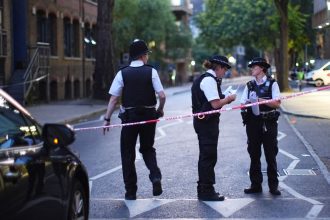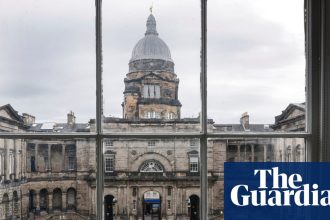Jewish leaders are calling on the University of Edinburgh to retain a contentious definition of antisemitism as the institution considers its support for the International Holocaust Remembrance Alliance (IHRA) guideline. The university announced its review on Sunday, hinting that it could potentially abandon this globally recognized definition, which critics claim limits freedom of speech regarding Israel and Palestine.
The discussion intensified following a recent evaluation of Edinburgh’s connections to transatlantic slavery and colonialism, prompting recommendations that the university withdraw its adherence to the IHRA definition and divest from entities purportedly linked to Israel’s military actions in Gaza and the West Bank.
In response, the Union of Jewish Students (UJS) and the IHRA released a statement, emphasizing that the definition is a “non-legally binding practical tool” intended to help identify and counter antisemitism, and is widely embraced by British Jews and Jewish student bodies. Louis Danker, president of the UJS and a recent graduate of Edinburgh, expressed dismay over the proposal. He remarked that the IHRA definition has garnered unwavering support at UJS conferences.
“We remind the academics who authored this review the principle of self-definition applies to all minorities, including Jewish students,” he stated. “Edinburgh must ensure that the IHRA definition is protected, and that antisemitism is treated with the same severity as all forms of discrimination.”
The IHRA noted that over 40 countries have adopted its definition, urging that any review is conducted with a comprehensive understanding of the definition’s role in safeguarding Jewish communities.
Peter Mathieson, the principal of the university, informed the Guardian that the institution began evaluating its investments in Israel and reconsidering its stance on the definition prior to the recommendations from the race review, though no conclusive actions have yet been made. He added that discussions with Jewish students, staff, and national organizations indicated that opinions among British Jews are not unified. “It’s not straightforward to say that we should adopt or not adopt that definition, or indeed other definitions, not just of antisemitism but of Islamophobia and [so on],” he remarked.
Vincent Fean, a trustee of the Britain Palestine Project and a former consul general in Jerusalem, countered that the 2021 Jerusalem Declaration on Antisemitism, crafted by experts in Holocaust, Jewish, and Middle Eastern studies, offers a more effective framework. He pointed out that this declaration differentiates between legitimate critiques of Israel and antisemitic sentiments, welcoming the review’s recommendation to establish a Palestinian research center that acknowledges the historical marginalization of Palestinian scholarship.
Activists from the Justice for Palestine Society and the Kehillah, a group of anti-Zionist Jewish students at Edinburgh, similarly urged the university to reject the IHRA definition, claiming it suppresses criticisms of Israel by categorizing them as antisemitism. “This definition silences the plurality of Jewish opinion on Zionism,” they declared.
Additionally, Fiona McClement, the university’s head of equality, diversity, and inclusion, announced plans to enhance efforts aimed at decolonizing its curriculum and fostering a more inclusive racial environment on campus, following revelations regarding the university’s historical links to slavery and racism.
Despite prior initiatives to tackle biases within its curriculum, the report noted that outcomes have been inconsistent, and the university’s recruitment efforts have failed to improve diversity. Among its recommendations is the creation of a dedicated center focused on the study of racism, colonialism, and anti-Black violence, which would secure funding for senior researchers while being accessible to the broader community. Mathieson affirmed that the university is working to secure funds for this initiative.
Further suggestions include launching a new undergraduate course centered on decolonization by next year, and centralizing curriculum reforms to create a cohesive strategy for addressing colonial and racial histories.
McClement acknowledged that while Scotland is less diverse than other regions of the UK, “there is no reason why we shouldn’t be working extremely hard to be a place where Black scholars and Black students really want to come and study.” Current statistics show that less than 1% of staff and about 2% of students at the university identify as Black, significantly below the average at elite Russell Group universities.
She recognized that evolving Edinburgh’s demographic profile is a gradual process, asserting that students “seeing themselves represented in the curriculum” would greatly enhance impact and that increasing recruitment of Black academic staff is essential.
In the wake of the review’s release, senior scholars at Edinburgh are advocating for additional funding to further investigate the substantial yet untraced financial links to transatlantic slavery and colonialism. They suspect that the university has received far more than the £30 million in present-day equivalents that has been traced from former students and donors associated with enslavement since the late 18th century, including connections to the East India Company and apartheid South Africa.
While there is documented evidence indicating significant bequests from known enslavers reflected in the university’s financial accounts, detailed scrutiny is necessary. Dr. Simon Buck, one of the primary researchers involved in the inquiry, remarked that the figures identified thus far represent a mere fraction of the larger sum. “This report should be a starting point; it should be a living project and not something stamped ‘there’s nothing else to see here’,” he emphasized.
Daryl Green, co-director of Edinburgh’s Centre for Research Collections, who assisted in uncovering new evidence, expressed a desire to hire several archivists to properly catalogue the documents. “There’s a huge amount of information in the archive that could be unlocked,” he said, noting that while custodianship has been adequate, there has been a lack of resources to fully utilize the archives meaningfully.
The university’s review of its decolonization efforts has highlighted significant gaps within its financial records that have yet to be thoroughly explored. Several of its colleges failed to provide updated evaluations for bequests linked to the inquiry, and bequests from benefactor Robert Halliday Gunning, whose wealth derived from Brazilian goldmines utilizing enslaved labor, have become entwined within combined funds held by the medical school. “You can’t really understand the history of Scotland without understanding the history of imperialism and increasingly the history of Atlantic slavery,” Buck concluded.














